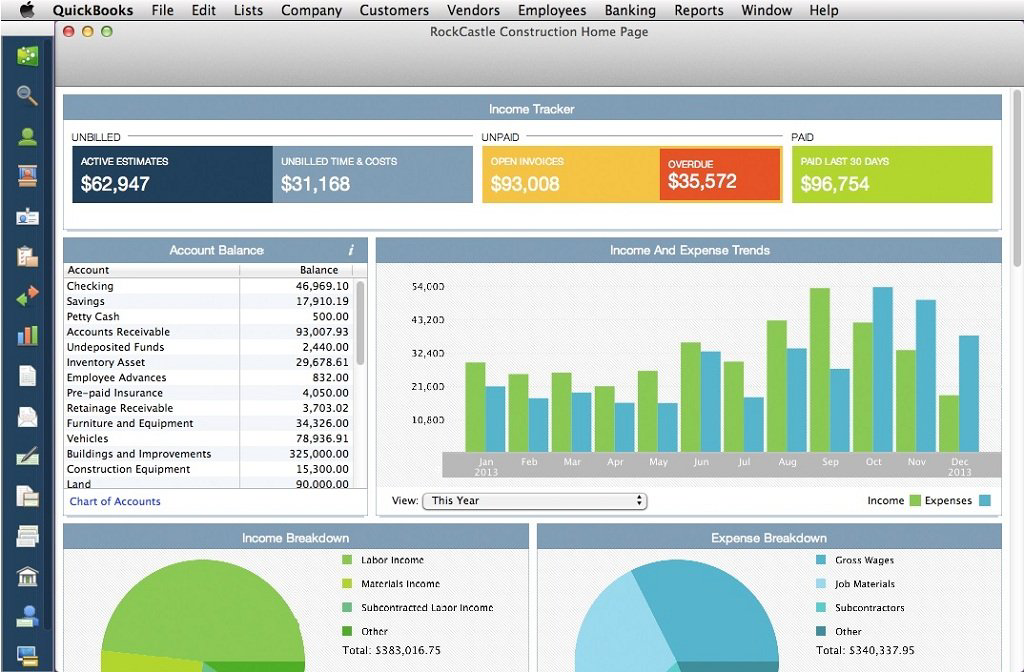When Intuit introduced a new design for its products, it was aiming for a harmonic look and feel across its solutions that made it easier for users to use. But, it didn’t just stop there. The maker of financial management solutions decided they wanted to make business easier for small business owners.
In the past year, Intuit has debuted an app depot, offered seamless integration with a wealth of apps and acquired several companies that will help expand its service offerings while increasing capabilities within QuickBooks Online. Intuit has been pretty vocal about building their QBO ecosystem to create a foundation for small business success and the series of acquisitions falls in line with their current strategy.
“I have long observed that the brain and heart behind small businesses is really a system that contains all of their transactions, customer and vendor information and more in one place. The heart of the system contains their information, while the brain gives them insight into how the business is doing, identifies areas of growth and where they need to focus, such as with customers who don’t pay on time,” said Terry Hicks, Vice President and General Manager, Intuit QuickBooks Online Ecosystem.
Intuit’s goal is to seamlessly integrate data into their solutions that customers need to not only run their business, but also grow it. In order to achieve this, they have primarily focused on serving the different needs of their customers while continuously reducing the pain points of data integration. In looking at the companies they acquired, Intuit assessed how well those companies would allow them to serve their customers and integrate essential data.
“Everything we do is led by customer feedback, so we are constantly paying attention to the capabilities that we currently have and what our customers say they want. When we scan the market, we look for the best-in-breed, the best solution that will allow us to address our customers' needs. Many times the best-in-breed isn’t just about meeting the immediate needs of customers, but looking long-term as well,” said Hicks. “Another important consideration is the team itself – who is the team, what is their vision, do they have the talent to carry out our strategy? All of this is needed to expand our success.”
Intuit recognizes that their small business customers fall into two categories – service-based companies and product-based companies – which create unique business needs for each category. Moving forward, the company wants to expand their ecosystem to include more solutions for small businesses selling products. In the U.S., a majority of their customers provide a service, as opposed to selling a product. However, even a significant percentage of these companies offer products for sale to complement the services they provide. As Intuit continues to expand globally, their base of product-based customers also continues to expand exponentially.
“We’re continuing to build out capabilities to serve the product-based business with features such as inventory and order management. With our acquisition of Lettuce, we are better able to serve the needs of those product-based businesses. Our ultimate vision is to change the way businesses engage with their employees, vendors and customers. From the supply chain to the order sales portal, to ecommerce to delivery, it’s all integrated,” said Hicks.
Ultimately, the acquisitions help center QBO as the platform from where an entire business is run. Intuit has created a central hub that seamlessly integrates with other solutions, both ones created by Intuit and other developers, to help small business owners manage every aspect of their business.
“We want to continue to build a platform that not only makes accounting and bookkeeping invisible, but expands to help make the business run better as a whole. No small business owner wakes up and says, ‘I want to do bookkeeping for my business.’ They want to spend more time pursuing the passion that led them to create the business. But, it’s not just about reducing the time spent on bookkeeping and accounting. It’s also about growing your business and facilitating front office activities and engagement with customers,” said Hicks.
Intuit also wants to use the acquisitions to better serve the needs of those who are new to the Cloud or just realizing the benefits. With the added capabilities, the company is better-positioned to offer the same inventory capabilities that desktop users have enjoyed for years, plus more.
“We want our desktop users to not only see that the features they have enjoyed on the desktop are now available in QuickBooks Online, but also how being online can really free up resources and time. There’s a lot of data that sits outside of QuickBooks. We want to make it automatic to get the data to flow into our ecosystem, regardless of the source, so customers don’t have to spend time key entering that data. They can spend more time taking action that directly impacts their own customers,” said Hicks.
Even though Intuit is encouraging small business owners to embrace the Cloud, it is not abandoning its desktop solution. It will continue to invest in and improve their desktop version, but hopes that over time small businesses will realize many of the benefits of working seamlessly in the Cloud.
“We have worked hard to reinvent QuickBooks Online over the past two years. It’s even stronger in terms of the service and value it provides to our customers and how we connect with third-party apps,” said Hicks.
Callout:
Intuit Acquisitions
- invitco (May 14)
- Based in Sydney, Australia, invitco is focused on developing technology specializing in the receipt, processing and data extraction from PDF files in the cloud.
- Lettuce (May 8)
- A start-up focused on providing inventory and order management solutions to product-based small businesses.
- CustomerLink (April 9)
- Markets direct mail and analytics SaaS solutions for small businesses in the automotive industry.
- Docstoc (December 4, 2013)
- A provider of user-generated and premium business documents.
- Prestwick Services (November 20, 2013)
- A subsidiary of AP Intego, Prestwick allows small businesses to manage the workers’ comp payment process.
- Full Slate (October 30, 2013)
- Online scheduling software designed to help local service providers fill their appointment books online.
- Level Up Analytics (October 23, 2013)
- A consulting company focused on providing applied data analysis, strategic consulting services and full development of data-driven products.
- GoodApril (August 8, 2013)
- Provides users with an analysis of their tax situation, including their potential tax bill in the coming year as a result of new tax rules and potential tax savings opportunities.
Thanks for reading CPA Practice Advisor!
Subscribe Already registered? Log In
Need more information? Read the FAQs
Tags: Firm Management, Software, Technology





